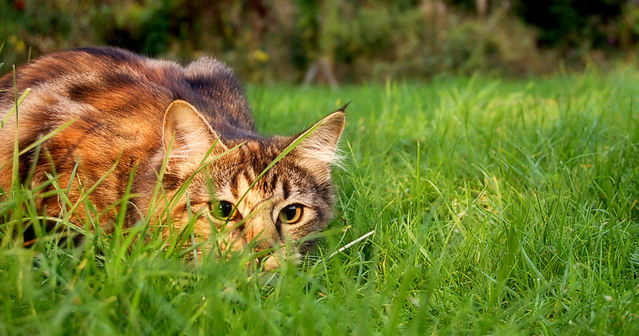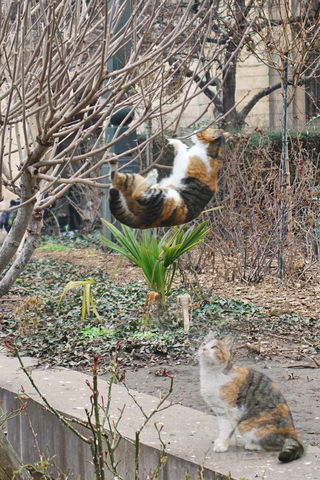Animal Behavior
Do Domestic Cats Have a Right To Roam?
Many cat owners value their pets’ wildness and resist confining them indoors.
Posted January 8, 2019
Few owners—farmers aside—actively encourage their pet cats to go out hunting. Nevertheless, many owners seem reluctant to take preventive measures, such as confining their pet indoors, despite the evidence that pet cats can sometimes deplete local wildlife populations. I’ve previously argued that the very stridency of the wildlife lobby in demonising domestic cats may have increased the resolve of some owners to resist their calls for cats to be restricted or even banned outright.

Anti-cat feelings run highest in Australasia, where the indigenous wildlife appears especially vulnerable, having evolved in the absence of a cat-sized predator, and also in North America. In the UK, the consensus is that pet cats have little effect on wildlife populations, apart from the few that stray into nature reserves with vulnerable species, such as ground-nesting birds. There may be good biological reasons behind this: In Europe, free-roaming domestic cats have lived alongside wildlife for millennia, and there is evidence for recent adaptation to cat predation by some birds.
Cat owners in the UK accordingly have a fairly relaxed attitude towards their pet’s impact on the local fauna, and only about a quarter consider hunting an important issue. This proportion rises to little more than one in three among non-owners, some of whom may well have taken their predatory habits into account when deciding that cats are not for them. Cats remain popular as pets, occupying about a quarter of British households, and only about 10 percent are kept permanently indoors (and many of these are expensive purebreds), in stark contrast to the US.., where perhaps two-thirds are never allowed outdoors. In an international comparison of attitudes towards cats, the UK scored lowest both for considering cats a threat to wild animals (despite being overwhelmingly pro-wildlife) and in the desirability of legislation to restrict cats from coming and going as they please. In British law cats are classified as property, and, unlike dogs, their owners cannot be held accountable for their actions. Official guidance on the welfare of cats refers to enabling the performance of “natural behavior,” which presumably includes predatory behavior, either real or simulated. Does this imply that British cat owners simply do not care about their pets’ predatory habits, or have they not yet been sufficiently pressurized into facing up to what some consider their most irresponsible habit?

A new study has demonstrated that, even in the UK, most cat owners express some unease about their cats’ hunting prowess, but at the same time feel that they do not have the right to stop them. Semi-structured interviews with 48 cat owners revealed a range of attitudes towards hunting, but few (apart from two living on farms) considered hunting a desirable feature of owning a cat. The predominant view was somewhat paradoxical; hunting should be tolerated because it is “natural,” but it is a problem nonetheless, for owner and prey alike. In the words of one respondent, “It’s a kind of mixture. Like, it’s acceptance that that’s in their nature to do it, but, you know... I still feel a bit cross with them.” Cats are often valued for their wild side: “I think there’s a general perception…that cats are independent by nature and they’ll do exactly what they like. In some ways, that’s why we like them, because they do that.” The interviews also revealed some recognition that pet cats have an unfair advantage because they can seek the protection of their owners whenever they need to: “[Wildlife has] got more right, I think to be there than the cat. Well, [cats are] domesticated, aren’t they? They’re not a wild thing…”
Natural, perhaps, but not desirable. Many owners expressed distaste at having to deal with the prey that their cats brought home, whether alive, maimed, or dead. They also perceived that they might have some responsibility to reduce their cat’s hunting but did not know how to control it without impinging on the cat’s well-being or restricting it unduly. “I could shut the cat flap at night so he doesn’t get out… But then for me I’m denying him his natural instincts.” Many owners had considered restricting their cat’s comings and goings, but primarily to keep them safe, not so much to save the lives of wild birds and mammals.
Although UK cat owners tend to feel that restricting their cats’ movements is unnatural, they are generally in favor of restricting their right to reproduce. Neutering (desexing) rates are as high in the UK as they are in Australasia and the U.S., in many localities above the level needed for the pet cat population to be self-sustaining, resulting in the adoption of cats from farms or from other neighborhoods. This apparent paradox has only emerged in the past half-century or so, with the advent of safe and affordable surgeries. Neutering, preferably pre-pubertal, is heavily—and very successfully—promoted by animal welfare charities as the most humane way of limiting the cat population and ensuring the highest possible welfare.
Cats’ right to breed, though irrefutably “natural,” seems to have become a non-issue: How long until their right to roam goes the same way?


